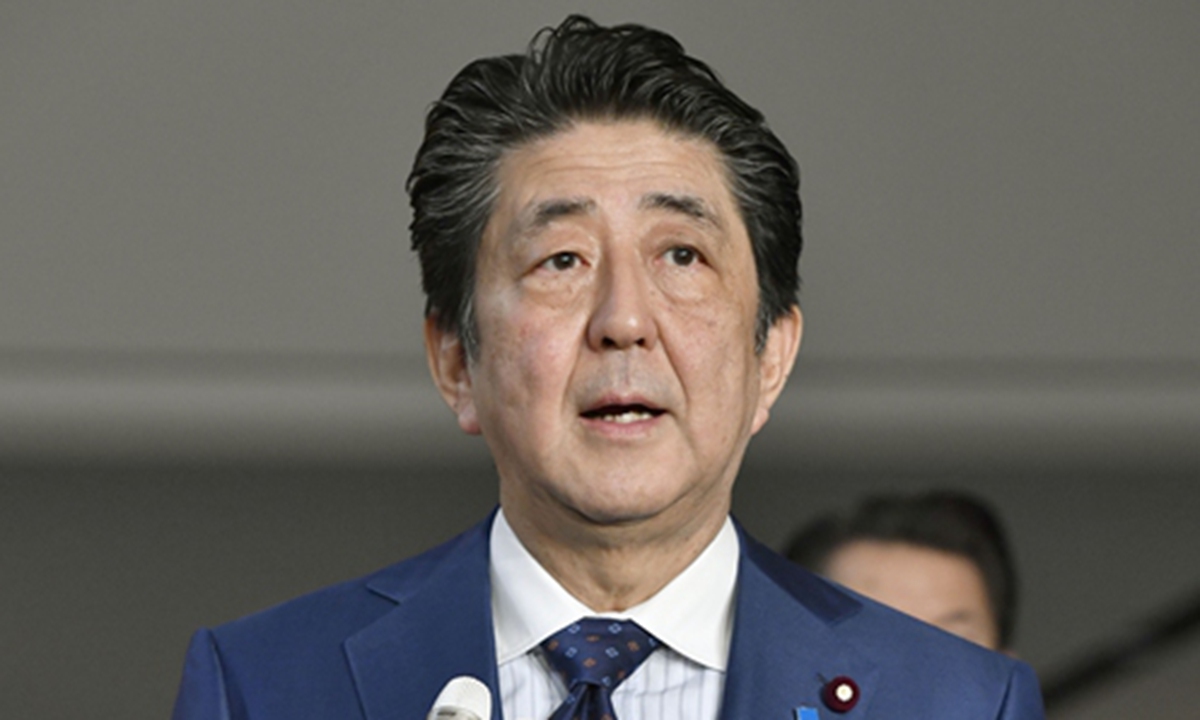
Japanese Prime Minister Shinzo Abe Photo: IC
Former Japanese prime minister Shinzo Abe said on Sunday that Japan should consider a nuclear-weapons sharing agreement with the US in the wake of the crisis in Ukraine. He took some NATO member states as example, saying that NATO's nuclear sharing arrangement enables the US to keep its nuclear weapons in Europe under its custody. He claimed that "we should not put a taboo on discussions about the reality we face," in spite of Japan's participation in the Nuclear Non-Proliferation Treaty and the three principles of no producing, no possessing or not allowing nuclear arms on its territory. Despite the obscurity of his words, Abe's intention is clear: He wants to move toward the pursuit of nuclear weapons.
Abe's remarks are not just a whim. Such intention has been stirring for quite a long time among right-wing Japanese politicians. Abe himself, for example, said in May 2002, when he was serving as deputy chief cabinet secretary, that it was "not necessarily unconstitutional" for Japan to use small tactical nuclear weapons to defend itself. In 2014, when he was the then Japanese prime minister, Japan was caught in a serious scandal over 640 kilograms of plutonium that it "failed to report. " Furthermore, Ichiro Ozawa, then leader of Japan's opposition Liberal Party, also claimed that Japan could make a large number of nuclear weapons "overnight" to curb China.
It is not only ironic, but also a huge real risk, that a group of people in the only country in the world that was bombed by atomic bombs would call for an invitation to the culprit to deploy nuclear weapons in their own territory. Japanese right-wing politicians are more fanatical about nuclear weapons than politicians in any other country in the world, and today, they have evolved into a perverted psychology that borders on distortion. The shame of the defeated country and the desire for revenge, though always suppressed, have constantly lurked in their blood, eager to break free from the shackles.
What's even more alarming is the fact that Japan has some manufacturing capability for nuclear weapons. Japan is a highly industrialized country with one of the world's top large-scale computer systems and the ability to simulate nuclear tests. As previously reported in Japanese media, Japan holds 47 tons of plutonium at home and abroad, which, in terms of quantity alone, could produce about 6,000 nuclear bombs. Moreover, Japan has considerable capabilities in nuclear carrier development, not only in developing the solid-fuel rockets that could be used to carry a warhead, but its F-15 and other warplanes can also carry nuclear bombs after modifications, which are all open secrets. When serving as US vice president, Joe Biden said in 2016, "Japan has the capability to acquire nuclear weapons virtually overnight," and a US nuclear expert once said Japan was "little more than a screwdriver away from a nuclear weapon."
As soon as Japanese right-wing's madness is combined with its national capabilities, the consequences will be devastating. This would, to a large extent, mean a total change in the nature of Japan as a nation, a complete release of its military capabilities, and perhaps an escape of militarism from the cage that has trapped it for nearly 80 years. Then, the fear of nuclear terrorism would be emerging in East Asia. At that moment, the nuclear balance in Asia will be completely broken, and the geopolitical situation will face a major alteration. No Asia-Pacific country will be able to make itself better.
This is a major loophole in the world's nuclear non-proliferation regime and it has not been fixed because of Washington's connivance and even complaisance. The US is aware of the right-wing movement in Japan but it sees the country as the most important lever to counterbalance China in East Asia. As a result, using Japan to contain China is gradually becoming a priority for Washington. This has allowed Japanese right-wing politicians to see an opening and make the best of it to loosen the strategic strings that have tied them up for nearly 80 years, with nuclear capability likely to be their ultimate goal. At that point, Japan's nuclear warheads could be aimed at East Asian countries like China, the US or any other country.
Therefore, Abe's relevant statement must not be treated as "personal remarks" and let off easily. It should be something that everyone in the international community condemns and opposes whenever it comes to light. This is a major issue of right and wrong to maintain the international system and security pattern and it cannot be watered down in any way.




